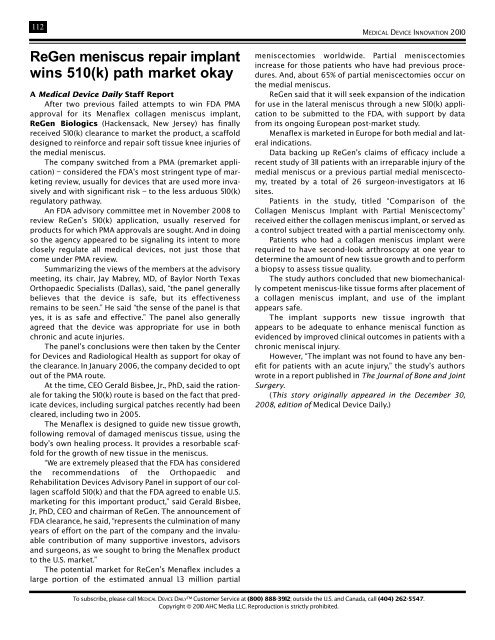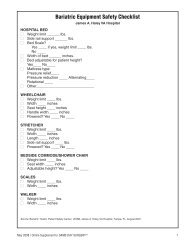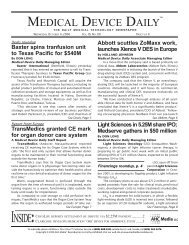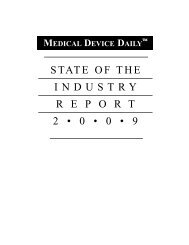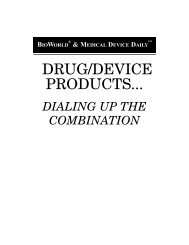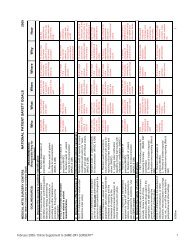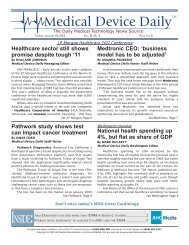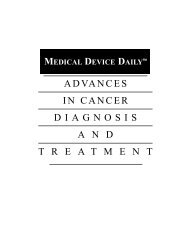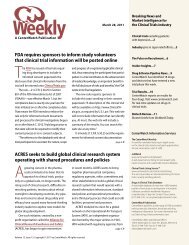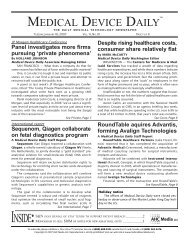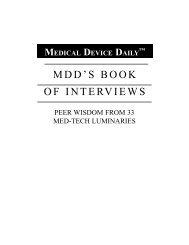MEDICAL DEVICE INNOVATION - Medical Device Daily
MEDICAL DEVICE INNOVATION - Medical Device Daily
MEDICAL DEVICE INNOVATION - Medical Device Daily
Create successful ePaper yourself
Turn your PDF publications into a flip-book with our unique Google optimized e-Paper software.
112<br />
ReGen meniscus repair implant<br />
wins 510(k) path market okay<br />
A <strong>Medical</strong> <strong>Device</strong> <strong>Daily</strong> Staff Report<br />
After two previous failed attempts to win FDA PMA<br />
approval for its Menaflex collagen meniscus implant,<br />
ReGen Biologics (Hackensack, New Jersey) has finally<br />
received 510(k) clearance to market the product, a scaffold<br />
designed to reinforce and repair soft tissue knee injuries of<br />
the medial meniscus.<br />
The company switched from a PMA (premarket application)<br />
– considered the FDA’s most stringent type of marketing<br />
review, usually for devices that are used more invasively<br />
and with significant risk – to the less arduous 510(k)<br />
regulatory pathway.<br />
An FDA advisory committee met in November 2008 to<br />
review ReGen’s 510(k) application, usually reserved for<br />
products for which PMA approvals are sought. And in doing<br />
so the agency appeared to be signaling its intent to more<br />
closely regulate all medical devices, not just those that<br />
come under PMA review.<br />
Summarizing the views of the members at the advisory<br />
meeting, its chair, Jay Mabrey, MD, of Baylor North Texas<br />
Orthopaedic Specialists (Dallas), said, “the panel generally<br />
believes that the device is safe, but its effectiveness<br />
remains to be seen.” He said “the sense of the panel is that<br />
yes, it is as safe and effective.” The panel also generally<br />
agreed that the device was appropriate for use in both<br />
chronic and acute injuries.<br />
The panel’s conclusions were then taken by the Center<br />
for <strong>Device</strong>s and Radiological Health as support for okay of<br />
the clearance. In January 2006, the company decided to opt<br />
out of the PMA route.<br />
At the time, CEO Gerald Bisbee, Jr., PhD, said the rationale<br />
for taking the 510(k) route is based on the fact that predicate<br />
devices, including surgical patches recently had been<br />
cleared, including two in 2005.<br />
The Menaflex is designed to guide new tissue growth,<br />
following removal of damaged meniscus tissue, using the<br />
body’s own healing process. It provides a resorbable scaffold<br />
for the growth of new tissue in the meniscus.<br />
“We are extremely pleased that the FDA has considered<br />
the recommendations of the Orthopaedic and<br />
Rehabilitation <strong>Device</strong>s Advisory Panel in support of our collagen<br />
scaffold 510(k) and that the FDA agreed to enable U.S.<br />
marketing for this important product,” said Gerald Bisbee,<br />
Jr, PhD, CEO and chairman of ReGen. The announcement of<br />
FDA clearance, he said, “represents the culmination of many<br />
years of effort on the part of the company and the invaluable<br />
contribution of many supportive investors, advisors<br />
and surgeons, as we sought to bring the Menaflex product<br />
to the U.S. market.”<br />
The potential market for ReGen’s Menaflex includes a<br />
large portion of the estimated annual 1.3 million partial<br />
<strong>MEDICAL</strong> <strong>DEVICE</strong> <strong>INNOVATION</strong> 2010<br />
meniscectomies worldwide. Partial meniscectomies<br />
increase for those patients who have had previous procedures.<br />
And, about 65% of partial meniscectomies occur on<br />
the medial meniscus.<br />
ReGen said that it will seek expansion of the indication<br />
for use in the lateral meniscus through a new 510(k) application<br />
to be submitted to the FDA, with support by data<br />
from its ongoing European post-market study.<br />
Menaflex is marketed in Europe for both medial and lateral<br />
indications.<br />
Data backing up ReGen’s claims of efficacy include a<br />
recent study of 311 patients with an irreparable injury of the<br />
medial meniscus or a previous partial medial meniscectomy,<br />
treated by a total of 26 surgeon-investigators at 16<br />
sites.<br />
Patients in the study, titled “Comparison of the<br />
Collagen Meniscus Implant with Partial Meniscectomy”<br />
received either the collagen meniscus implant, or served as<br />
a control subject treated with a partial meniscectomy only.<br />
Patients who had a collagen meniscus implant were<br />
required to have second-look arthroscopy at one year to<br />
determine the amount of new tissue growth and to perform<br />
a biopsy to assess tissue quality.<br />
The study authors concluded that new biomechanically<br />
competent meniscus-like tissue forms after placement of<br />
a collagen meniscus implant, and use of the implant<br />
appears safe.<br />
The implant supports new tissue ingrowth that<br />
appears to be adequate to enhance meniscal function as<br />
evidenced by improved clinical outcomes in patients with a<br />
chronic meniscal injury.<br />
However, “The implant was not found to have any benefit<br />
for patients with an acute injury,” the study’s authors<br />
wrote in a report published in The Journal of Bone and Joint<br />
Surgery.<br />
(This story originally appeared in the December 30,<br />
2008, edition of <strong>Medical</strong> <strong>Device</strong> <strong>Daily</strong>.)<br />
To subscribe, please call <strong>MEDICAL</strong> <strong>DEVICE</strong> DAILY Customer Service at (800) 888-3912; outside the U.S. and Canada, call (404) 262-5547.<br />
Copyright © 2010 AHC Media LLC. Reproduction is strictly prohibited.


